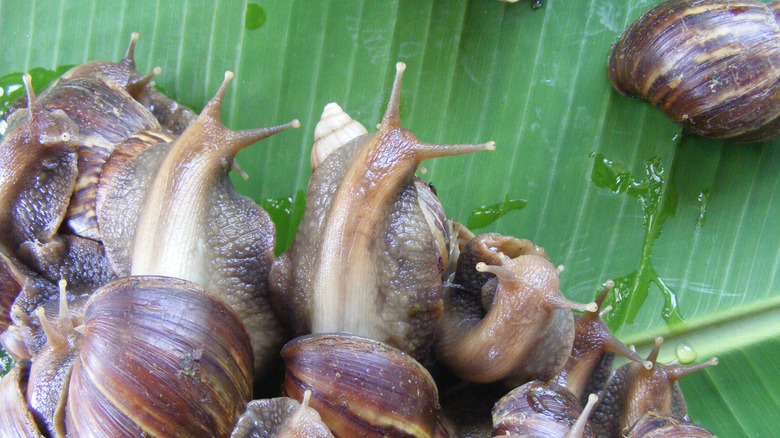How Snails Are Causing A New Wave Of Foodborne Illness In Africa
Most people associate eating snails with France's notorious Escargot, but snails are also a popular dish throughout parts of sub-Saharan Africa. However, new research shows that this culinary tradition may also be the cause of foodborne illnesses in countries like Cameroon (via Food Safety News).
According to All Africa, the practice of foraging African land snails for consumption is a common practice in nations like Cameroon, Nigeria, and Ghana. The meat is considered highly nutritious. According to the researchers in charge of the study, snail meat is 51% protein which far outpaces the 15-19% found in other common meats. Snail's slime is also a popular ingredient in many cosmetic products.
Some have even taken to snail farming as a means of financial gain. Demand for the animals has grown so much that Heifer International has launched a snail program to help teach people in Cameroon how to raise snails for profit. La Cameroon Radio Television reports that the practice is most popular in the Southwest where the many marshes and water bodies make great habitats for the slimy treats.
Snails role in spreading illnesses is likely undercounted
The growing popularity of snails may also be contributing to a rise in foodborne illnesses in Cameroon, according to a new study published in Emerging Infectious Diseases. Researchers say that snail farming is still highly uncommon in rural parts of the country. Because of this, they are most often obtained through foraging. The study says that rural inhabitants can spend up to 20 hours searching in unsanitary conditions to find enough snails to sell. Food Safety News reports that the snails are a common sight at most markets in Cameroon.
Researchers reported finding Campylobacter, Yersinia, Listeria, Salmonella, and Shiga toxin-producing E. coli in their snail samples. They also reported that every sample contained at least one pathogen, while most contained several.
To obtain these specimens the researchers tested snails found at people's homes, on arable land, and in markets. Researchers acknowledged that most snails are cleaned with aluminum sulfate or salt and lime, and are often smoked, boiled, fried or grilled before consumption. They reported that a significant amount of bacteria still remained even after preparation. Based on their findings, researchers concluded that snails are likely contributing a significant number of foodborne illnesses in individuals living in sub-Saharan Africa, and encouraged further research into the matter.

